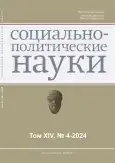Digital competence of students as a factor of the formation of socio-political attitudes
- Authors: Grebnyak O.V.1, Novozhenina O.P.1
-
Affiliations:
- Institute of Socio-Political Research of the Federal Center of Theoretical and Applied Sociology of the Russian Academy of Sciences (ISPR FCTAS RAS)
- Issue: Vol 14, No 4 (2024)
- Pages: 67-77
- Section: Proceedings of the Symposium
- URL: https://journal-vniispk.ru/2223-0092/article/view/279805
- DOI: https://doi.org/10.33693/2223-0092-2024-14-4-67-77
- EDN: https://elibrary.ru/ORIAVV
- ID: 279805
Cite item
Abstract
In the presented article, the authors consider the political and ideological intentions of the student youth associated with the activation of the network environment in order to predict the socio-political sustainability of civil society and assess possible risks. The process of political socialization of young people has undergone serious transformations in recent years: with the advent of new technologies, the forms of political activity and interaction have changed, the geopolitical situation has caused the activation of socio-political and patriotic movements. This led to a gradual transition even of the early stages of political socialization from a family environment to a social network environment. The changes also affected the processes of formation of civic culture, which are closely related to political socialization. The picture of the future of Russian society depends on how this has affected the specifics of the political worldview of students who are deeply immersed in the online environment. Based on the data of the All-Russian sociological research, an assessment was made of the dependence of the vector of socio-political attitudes of student youth on the level of their digital competence and network activity. As the analysis showed, students with increased network activity and developed digital competencies also have a great potential for dissatisfaction compared to a group of less digitalized students. Given the demand for labor personnel with skills to work in the digital environment, there is a need to take steps to reduce possible risks and channel them into positive forms of manifestation, since the current positioning of student youth can contribute to the growth of tension in society.
Full Text
##article.viewOnOriginalSite##About the authors
Oksana V. Grebnyak
Institute of Socio-Political Research of the Federal Center of Theoretical and Applied Sociology of the Russian Academy of Sciences (ISPR FCTAS RAS)
Author for correspondence.
Email: oksananov@yandex.ru
ORCID iD: 0000-0002-4565-7095
SPIN-code: 6256-1918
researcher
Russian Federation, MoscowOlga P. Novozhenina
Institute of Socio-Political Research of the Federal Center of Theoretical and Applied Sociology of the Russian Academy of Sciences (ISPR FCTAS RAS)
Email: olganov@yandex.ru
ORCID iD: 0000-0003-3511-0384
SPIN-code: 7343-9887
senior researcher
Russian Federation, MoscowReferences
- Anishchenko A.V. The phenomenon of digital political participation: Forms, models and essential aspects. Science. Culture. Society. 2023. Vol. 29. No. 4. Pp. 18–27. (In Rus.). doi: 10.19181/nko.2023.29.4.2.
- Volodenkov S.V., Fedorchenko S.N. Digitalization of the contemporary policy space under the conditions of global technological transformations: Relevant scholarly approaches, models, and scenarios. Moscow University Bulletin. Series 12. Political Science. 2022. No. 2. Pp. 46–57. (In Rus.).
- Garin I.Yu., Leskova I.V. Political participation of youth: The discourse of socialization and the formation of citizenship. Political Science and Technology. 2023. Vol. 3. No. 1. (In Rus.). URL: https://politicjournal.ru/PDF/02PK123.pdf
- Ivanova G.P., Logvinova O.K. Extracurricular activities in the modern university: Socio-pedagogical approach. Bulletin of Nizhnevartovsk State University. 2017. No. 3. Pp. 21–25. (In Rus.).
- Levashov V.K., Grebnyak O.V. Current changes in social media and the digital environment during a special military operation in Ukraine. Socialnye i gumanitarnye znanija. 2022. Vol. 8. No. 2. Pp. 204–213. (In Rus.). doi: 10.18255/2412-6519-2022-2-204-213.
- Levashov V.K., Grebnyak O.V. Russian citizens on the challenges of artificial intelligence, neural networks and social optimism. Sociological Studies. 2023. No. 11. Pp. 115–120. (In Rus.). doi: 10.31857/S013216250028537-3.
- Levashov V.K., Grebnyak O.V. Digitalization in the everyday and socio-political life of Russian citizens. Social Policy and Sociology. 2021. Vol. 20. No. 3. Pp. 99–108. (In Rus.). doi: 10.17922/2071-3665-2021-20-3-99-108.
- Prokazina N.V. Communicative practices of youth in real and virtual spaces. Science. Culture. Society. 2023. Vol. 29. No. 3. Pp. 69–81. (In Rus.). doi: 10.19181/nko.2023.29.3.3.
- Senator S.Yu., Sokolnikova E.I., Emelyanova M.V. Analysis of modern approaches to the implementation of patriotic education as a component of higher education. Pedagogy and Psychology of Education. 2023. No. 4. Pp. 123–136. (In Rus.). doi: 10.31862/2500-297X-2023-4-123-136.
- Telnykh E.O., Shekhovtsova E.A. Patriotic education vs non-systemic opposition. Human Capital. 2024. No. 3. Pp. 233–246. (In Rus.). doi: 10.25629/HC.2024.03.22.
- Shevchenko L.V. Development of civil subjectness in the conditions of the information society. Bulletin of the South-Russian State Technical University (NPI) Series: Socio-Economic Sciences. 2023. Vol. 16. No. 1. Pp. 274–282. (In Rus.). doi: 10.17213/2075-2067-2023-1-274-282.
- George J.J., Leidner D.E. From clicktivism to hacktivism: Understanding digital activism. Information and Organization. 2019. Vol. 29. Art. 100249. doi: 10.13140/RG.2.2.16347.82726.
- Valenzuela S. Unpacking the use of social media for protest behavior: The roles of information, opinion expression, and activism. American Behavioral Scientist. 2013. Vol. 57. Issue 7. Pp. 920–942. doi: 10.1177/0002764213479375.
Supplementary files










